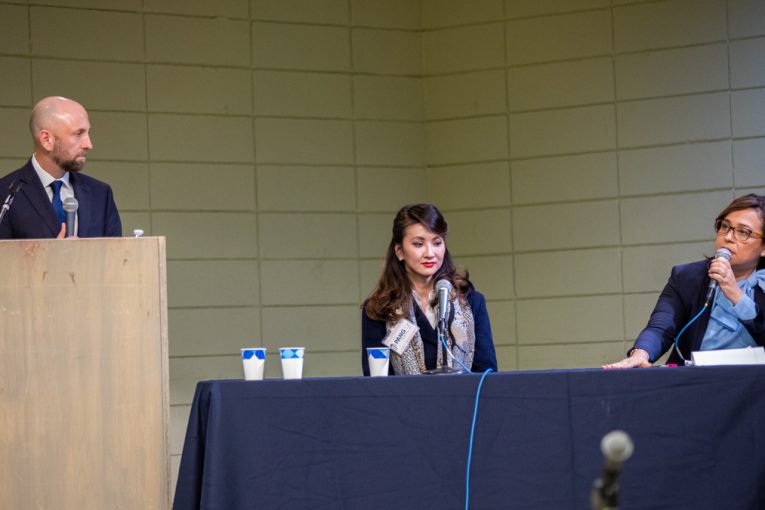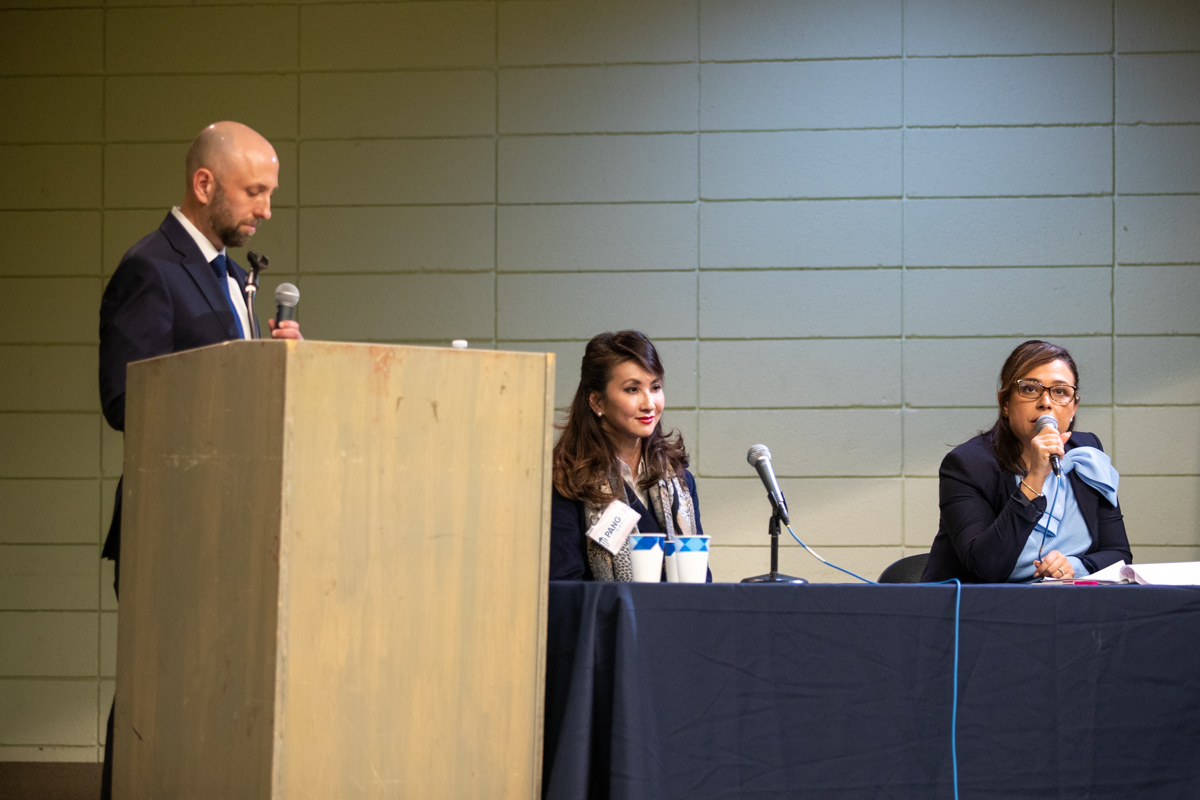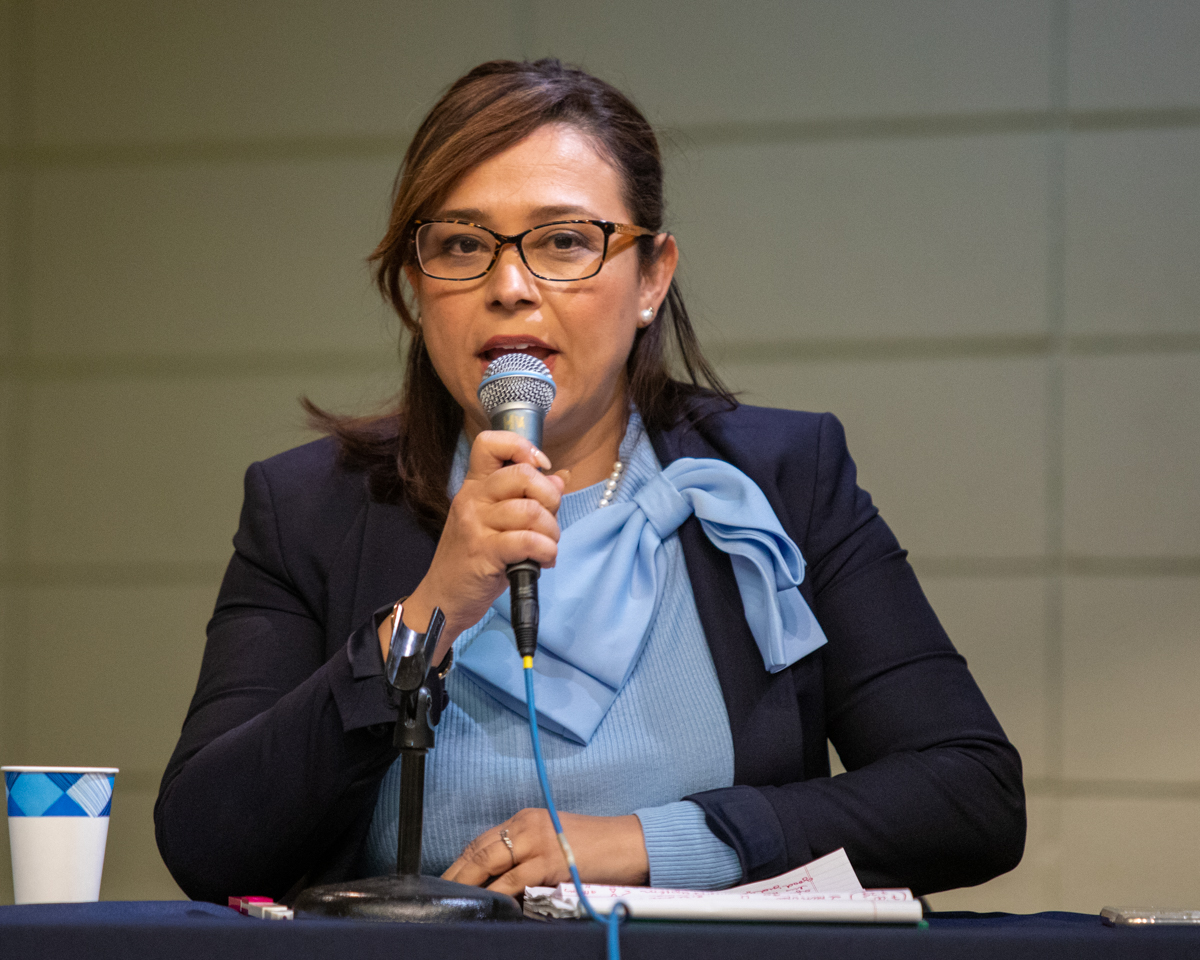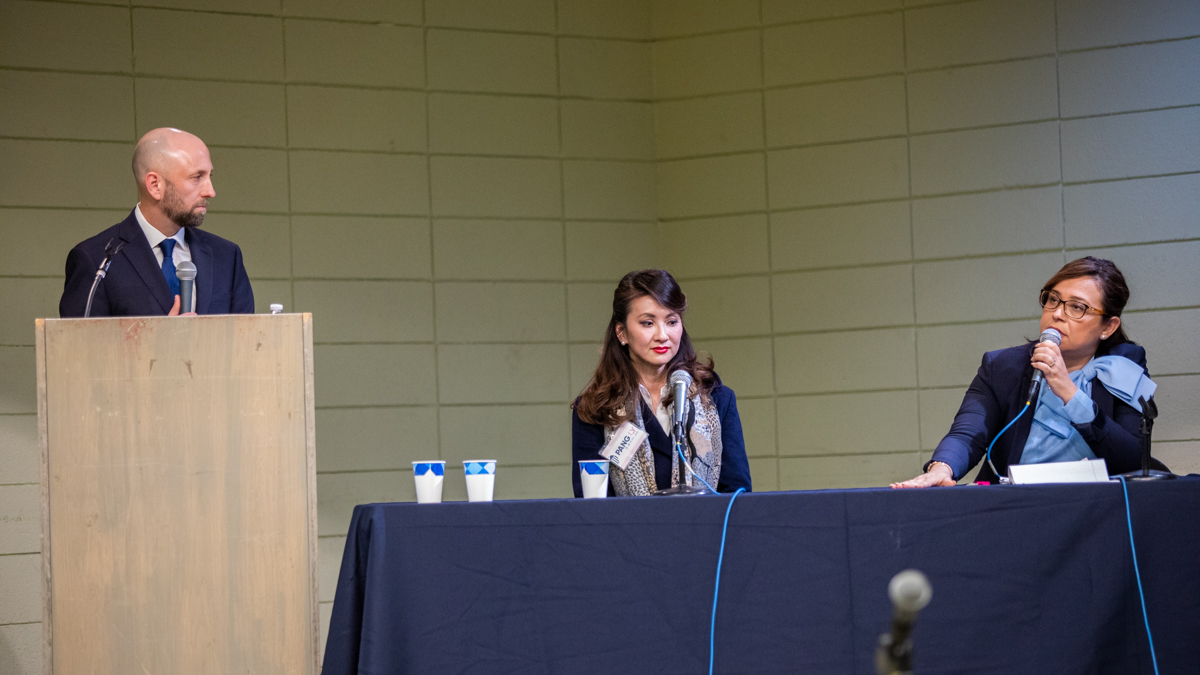

Five of the six candidates for judge were on hand on Wednesday night at the County Fair Building in San Francisco. Carolyn Gold for the 21st Seat sent her regrets.
There are an unprecedented three open seats in San Francisco, which has allowed six women candidates to emerge – two per seat. On Wednesday, on hand were Michelle Tong and Dorothy Proudfoot for the 18th, Maria Evangelista and Pang Ly for the 1st and Kulvindar Singh for the 21st.
The 1st Seat features public defender Maria Evangelista against former prosecutor Pang Ly.
The first question asked for an instance in which they faced an ethical dilemma and how they resolved it.

Maria Evangelista: When I started running for judge, I realized that I had to walk the line because we have the canons and the ethics that say you can’t make it politicized. That’s something you grow and you learn over time. As the campaign proceeds there’s a lot of people that will ask you political questions. So as I proceeded I basically avoided those questions and I tell people about the experiences that I’ve had personally instead of trying to address them in a political way and make promises that I may or may not be able to commit to.
One of the things that really intrigued me and made me want to come here tonight about Stop Crime SF, is that as a San Franciscan I live on the west side and my kids go to St. Brendan School. I  was in the middle of a criminal case doing an opening and voir dire on a home invasion burglary and my house got robbed.
was in the middle of a criminal case doing an opening and voir dire on a home invasion burglary and my house got robbed.
I felt completely victimized, they stole thousands of dollars worth of tools and the police were so dear and they came and they comforted me and I felt better. But at the end of the day, nobody was caught and I felt really upset about it.
Here I am arguing for this individual who, by the way, the jury did not find guilty and I felt very victimized. Part of the issue is that I have to separate those feelings and say why are property crimes up? In 2017, we had 30,000 auto break-ins but only 500 were arrests and 400 prosecuted. I think there is a serious demand for property because there is a serious drug addiction and we have to get to the root cause of that. We will never hire enough police officers to get to all of these crimes committed.

Pang Ly: It’s been a long time since I’ve been a DA and I know everyone’s always focused on criminal matters. But for the past 20 years I’ve been dealing with civil. I want to bring your attention to civil because that is also a very significant part of a judge’s duty.
The question really raises a time when I had a person who was the plaintiff but he had questions about his competency and we were in a mandatory settlement conference and we were trying to negotiate a settlement to help him deal with whether or not he was going to have his home sold.
He had initially decided that he wanted it sold to his nephew but then he had changed his mind. It was clear to me that something was off. Even though he insisted he knew exactly what was going on. Even though he insisted he insisted he did not want his attorney involved. Even though he insisted he insisted that he wanted to go to trial.
As a judicial officer, I cannot facilitate further because it is unethical. If I notice that someone may have compromised to know the proceedings, I must stop. Even though my heart went out to him and his family for the trauma that they were going through and the challenges that they were experiencing.
This is why it’s so important to have a wide variety of experiences and discernment so that you can best serve the public even when they don’t understand that you’re serving them.
The second question asked about endorsements.
Pang Ly: First of all it’s actually 32 judges, but we’re not counting… This has a lot to do with the fact that I have not been campaigning at all. I didn’t even know if I was going to run until September or October when I learned that there would be an open seat.
It’s very rare to have an open seat. But when I learned that there was an open seat and having lived in San Francisco these past 15 years, I knew I couldn’t stay silent. I had to raise my hand. I knew I could do the job.
I’m grateful that 32 experienced, knowledgeable judges also believe and know that I can do the job. That’s why I don’t have the other endorsements – I’m not the politician.
I say that very respectfully. I just want to serve. I can do the job – it requires independence, it requires that you have discernment and know when to be compassionate and when to be courageous.
We need that in this time when we are facing a challenge about when is the law, and its failure to be enforced, failure to prosecute, failure to judgment corrodes all of our trust in the system because that’s another thing we should be mindful of. Corrosion of the community and as a judge I will do my best to make sure that I am uplifting and serving the whole community.

Maria Evangelista: I actually have not put all my endorsements up on the website. I have just put the main ones that people can identify with and I am definitely not a politician. I’m a mom, I live on the west side, I thrive on arts and crafts. And I’m a nerd.
Since I was young, I really enjoyed the idea of criminal justice and crime because my parents were Catholic and they always said people that commit crimes and people that do bad things are doing them as malum, because it’s a moral issue. When I went to school and went over the studies, I realized the factors that contribute to that. If we address those different factors then we can get your root causes of crime.
With regards to my endorsements, I am actually really proud of the judges that have endorsed me – I think I have six or seven. Judges and retired judges that have endorsed me – I didn’t ask most of the judges on the bench for their endorsements, I think I asked three or four.
For two reasons. One of them is that a lot of the judges over in criminal – said I’m still appearing in front of them and so is (Singh) so we’re still appearing in front of them and a lot of them are saying we have to maintain the appearance of propriety because if we don’t have that because we don’t have reason to believe that the system isn’t political. I’m also very proud of the support I’ve gotten from other areas like Asian American bar association.
Final question was what you perceive to be the greatest obstacle to justice.
Maria Evangelista: I think anywhere that you have a lack of access to equality and the justice system then we’re not going to have fairness. That means either for the defendant or the victim any pro per clients or anyone coming in civil, I think the issue is – is the access there.
When I grew up one of the reasons I was so interested in domestic violence and elder abuse was because in my community I saw that people were afraid to report crimes because they weren’t being believed or they were afraid of repercussions from the actual people committing the crimes. They didn’t trust the system or they came from countries where people were corrupt.
There has to be some way where we can be in that system and make it accessible to them. That’s the reason I went to the district attorney’s office and was working on those types of cases. It’s not just about language access and making sure that they have court certified interpreters which I did fight for, but it’s also understanding how the system works and making sure that everybody whether it’s victims, victim’s rights, restitution – making sure that they come to court and are able to say their piece when somebody gets sentenced.
Those are all victims rights that they are entitled to that they don’t realize they have access to. Even the defendant, they will always have a public defender that is going to fight for their constitutional rights…
Pang Ly: I think the greatest obstacle to justice is engagement. That means you, you, and me. We need to be engaged. It’s a system – that means there are many parts, there are laws, there’s enforcement, there’s prosecution, there’s the judges, the rehabilitation, the re-affirmation. I encourage you all to be like me, because I blame you all for making me run. I care too much. I’m going to do my part as the judge. I’m going to be sure to give my experience to help calibrate and make sure equal access whether it’s through language, whether it’s through resources, or whether it’s through compassion and courage. But I ask you all to do what you’re doing here tonight, and that’s being engaged.
In my neighborhood, we had a lot of environmental injustice – there was trash, graffiti, feces, bullets. I go out there and I sweep. I clean the graffiti, I report the bullets, I plant gardens. Why, because I believe in us. I believe we all have to do our part and if you elect me on March 3, I will continue to do my part and be courageous and compassionate for the whole community.
—David M. Greenwald reporting

